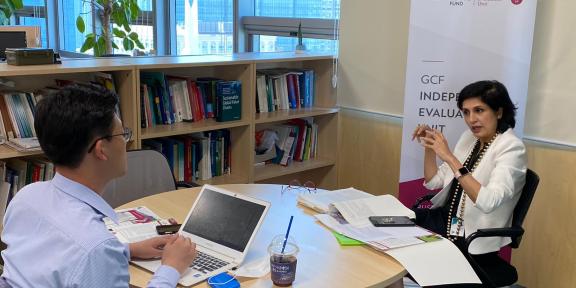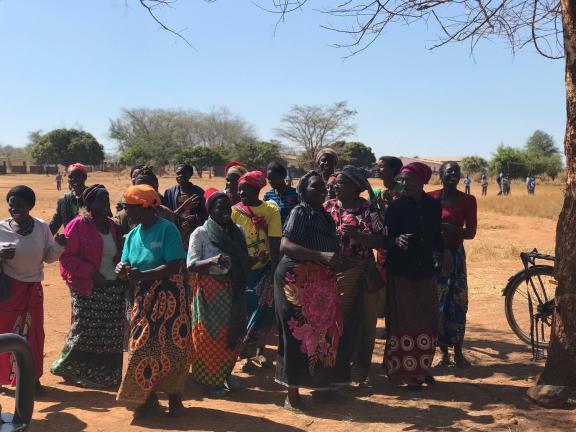Search
Evidence gap map and intervention heat maps: Climate change adaptation in low- and middle-Income countries
This evidence review examined evidence on climate change adaptation interventions and their effectiveness between 2007 and 2018. Results from 464 studies are included in an evidence gap map which shows large disparities...
Document > Operational document
Meta-analysis: Access to credit as a determinant of autonomous adaptation to climate change: A meta-analysis of the evidence
This meta-analysis report builds on the evidence gap map (EGM) and intervention heat map (IHM) that examines the evidence regarding the effectiveness of climate change adaptation interventions and linked financial flows...
Document > Operational document
Infographic (PPWW2024)
This infographic presents key findings and recommendations from the Independent Evaluation of the Green Climate Fund’s Approach to and Protection of Whistleblowers and Witnesses (PPWW2024). It highlights insights from...
Document > Evaluation brief
Scoping Study on the Use of Artificial Intelligence in Climate Change Evaluations
Commissioned by the evaluation units of the Adaptation Fund, CIF, GEF, and GCF, this 2025 study explores the potential of AI to enhance the quality, efficiency, and impact of climate change evaluations. It examines...
Document > Learning paper
GEvalNote 21: HWFW2024
This two-page GEvalNote summarizes the main findings and recommendations from the Independent Evaluation of the Green Climate Fund’s (GCF) Result Area on Health and Wellbeing, and Food and Water Security (HWFW).
Document > Evaluation brief
Gender Synthesis: Approach
This paper presents the proposed approach for conducting a Synthesis of the Green Climate Fund’s (GCF) Gender Approach. Informed by initial stakeholder consultations and a review of key documents, the paper outlines the...
Document > Approach paper
Approach Brief: Independent evaluation of the GCF’s approach to and Portfolio of Climate Information and Early Warning System Interventions
This brief summarizes the approach for the Independent Evaluation of the GCF’s Approach to and Portfolio of Climate Information and Early Warning System (CIEWS) Interventions. It outlines the evaluation’s context,...
Document > Evaluation brief
Effectiveness of Certification and Land Tenure Interventions to Conserve Forests
This protocol outlines the methodology for an evidence review on the effectiveness of certification and land tenure interventions in conserving forests. It details the research questions, inclusion criteria, search...
Document > Evaluation document
LAC2024: Executive Summary
This executive summary presents key findings and recommendations from the independent evaluation of GCF investments in Latin America and the Caribbean (LAC). It assesses relevance, effectiveness, country ownership, and...
Document > Evaluation brief
Effectiveness of certification and land tenure interventions to conserve forests - A systematic review
This systematic review assesses the effectiveness of certification and land tenure interventions in reducing deforestation and improving forest conservation outcomes. The review synthesizes findings from 45 impact...
Document > Learning paper
Executive Summary: Independent Evaluation of the GCF’s Simplified Approval Process
The Simplified Approval Process (SAP) was established to deliver faster and more accessible climate finance for smaller-scale, lower-risk projects in countries most vulnerable to climate change. This executive summary...
Document > Evaluation brief
COA2025: Approach paper for the Independent Evaluation of the GCF's Approach to Country Ownership
This approach paper outlines the plan for the Independent Evaluation of the GCF’s Country Ownership Approach. Approved by the GCF Board at its 40th meeting, the evaluation will assess how effectively the Fund’s country...
Document > Approach paper
Independent Synthesis of the GCF’s Gender Approach
Approved at the fortieth meeting of the GCF Board (B.40), this formative Gender Synthesis consolidates insights from past evaluations, assessments, and studies to inform the forthcoming Independent Evaluation of the GCF...
Document > Synthesis
Final report of the Independent Synthesis of Direct Access in the Green Climate Fund
The synthesis of Direct Access in the Green Climate Fund was conducted to assess and provide learning on the Fund’s implementation of the direct access concept and approach and to improve the relevance and performance...
Document > Evaluation report
Second Performance Review: Report of the Synthesis Study
This synthesis report is an early, stand-alone SPR product and analytical tool that seeks to lay a foundation for common understanding of what is known about the current status of the GCF for all key stakeholders...
Document > Synthesis
Learning Talk: Just Transition – What Does the Evidence Say?
Summary On 29 November, the IEU held a Learning Talk on Just Transition. The talk opened ... from a recent evidence review co-funded by the GCF-IEU and ILO on the evidence regarding interventions ... Panelists Martin Prowse, Evaluation Specialist, GCF-IEU Camilla Roman, Policy Specialist, ILO Anurag Mishra, ...
Event > IEU talk 
Learning talk: Water – What Works in Developing Countries?
Summary On 19 October 2023, the IEU held a learning talk on water sector interventions. This ... Jennifer Pampolina, Communications & Uptake Associate, GCF-IEU and Martin Prowse, Evaluation Specialist, GCF-IEU Discussants Beom-Sik Yoo, Senior Advisor (Asia/Oceania), ...
Event > IEU talk 
Private investor engagement key to climate-resilient world
... prominent at the GCF with mitigation projects, showed the IEU’s FPR published in June 2019. This is partly ... states, as well as its efficiency and effectiveness. “The IEU advises the board on the strategy for GCF,” she said. ... National University. Puri said the collaboration allowed IEU to improve the efficiency of workflow, by taking ...
Article > Interview 
Designing an M&E System for Impact Evaluation: Tips for Program Designers and Evaluators!
... just been invited to the Independent Evaluation Unit (IEU)’s Learning-Oriented Real-Time Impact Assessment ... geographic distribution, and measurement capabilities, the IEU will select six of these projects to provide better and ... Author Dr. Jyotsna Puri (Jo) in Madagascar where the IEU has a LORTA project. Two of the most often asked ...
Article > Blog 
PRESS RELEASE: ‘Green Climate Fund’s governance on track, but other improvements needed’: Independent report
... Produced by the GCF’s Independent Evaluation Unit (GCF-IEU) and adopted by the GCF Board at its thirty-fifth ... impacts for beneficiaries and asset resilience. The IEU’s projections indicate the Fund’s portfolio will ... said. “Nevertheless, the improvements noted by the IEU review and the Secretariat’s largely positive response ...
Article > News 
B.34 Data Outlook: Funding proposals for Board’s consideration
... present information about the GCF projects that are part of IEU’s Learning-Oriented Real-time Impact Assessment ... of the LORTA programme As a member of the LORTA team at the IEU, I would like to give you a quick tour of the programme. ... in implementation. Thus far, the project team, AE and IEU have published one fully completed impact evaluation ...
Article > Blog 
B.37 Data Outlook: funding proposals for the board’s consideration
... documents to the Board, and some findings from the IEU’s independent evaluation reports. What will be the ... This observation is in sync with findings from the IEU’s RPSP2023 evaluation, which established that the GCF ... non-state actors including the private sector entities. The IEU, amongst others, recommends in the RPSP2023 evaluation ...
Article > Blog 
Evidence review: Women's empowerment
Women’s empowerment is a key way to tackle gender inequality. Empowerment is an end in itself and also contributes to wider outcomes. By empowering women, individuals become agents of change and can catalyze climate...
Evidence review
Independent Evaluation of the Green Climate Fund’s Energy Sector Portfolio and Approach
This evaluation of the energy sector covered a wide geographic area of operations of the GCF with themes addressing the relevance, efficiency, suitability, effectiveness, and innovativeness of GCF’s portfolio in the...
Evaluation > Portfolio
Independent Evaluation of the Green Climate Fund’s Investment Framework
This evaluation looked at the overarching questions of how effective and fit-for-purpose the GCF’s investment framework, accompanying tools, criteria, and guidelines were in fulfilling the Fund’s strategic goals and...
Evaluation > Thematic
Evidence review: Behavioural science
While being the primary agent of mitigation and adaptation, human behaviours are the least studied aspect of climate change. With climate change intensifying globally each year, both mitigation and adaptation present...
Evidence review
If I could time travel: does access to credit help the decision to adapt to climate change in developing countries?
... in our gap-map [1], which will be published soon by the IEU and DEval. In our recent meta-analysis report [2] to be published by the IEU and DEval in the coming weeks, we analyze this ...
Article > Blog 
Independent evaluation of the relevance and effectiveness of the GCF's investments in the LDCs
The least developed countries (LDCs) are responsible for small additions to the overall GHGs stock globally but experience disproportionate impacts of its consequences.
The evaluation asks whether the GCF’s approach and...
Evaluation > Portfolio
Accountability in Climate Action
... of the global effort to tackle climate change. This IEU has completed an independent evaluation to inform ...
Article > Blog 
Going the Last Mile: Behavioural Science and Investments in Climate Change Mitigation and Adaptation (presented at Climate2020 Conference)
The purpose of this paper is to showcase how insights from behavioural science can be a potential solution for this last mile problem. It applies insights from ‘nudges’ and ‘boosting’ for a sample of ten projects by the...
Document > Other publication Pages
Filter by type
Filter by Subtype
Filter by Country
Filter by date